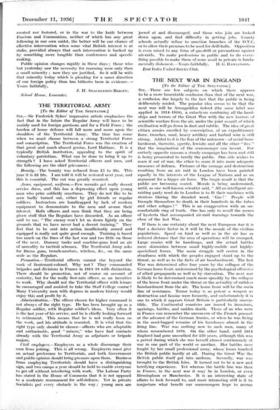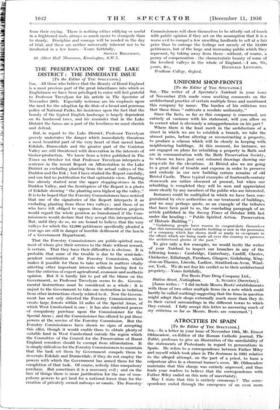THE NEXT WAR IN ENGLAND
[To the Editor of Tim SPECTATOR.] SIR,—There are few subjects on which there appears to be a more lamentable confusion than that of the next war, a confusion due largely to the fact that the public is being deliberately misled. The popular idea seems to be that the next war will be Armageddon indeed (the same label was applied in 1914-1918), a cataclysm combining all the hard- ships and terrors of the Great War with the new horrors of scientific warfare frOm the air, under the joint assault of which
civilisation will go down in dust and rubble: The idea of great citizen armies enrolled by conscription, of an expeditionary force, trenches, mud, heavy artillery and barbed wire is still strong. Added to it is the fear of the unknown—of aerial born-- bardment, thermite, yperite, lewisite and all the other " ites " that the imagination of the scaremonger can invent. For entirely opposite reasons a steady campaign has been and still is being prosecuted to terrify the public. One side 'wishes to scare it out of war, the other to scare it into more adequate measures of defence. Pictures of the carnage and destruction resulting from an air raid in London have been painted equally in the interests of the League of Nations and as an argument for a bigger air force. The tragic result is that the public are becoming scared. Morale is being undermined, until, as one well-known scientist said, "All an intelligent air- raiding party need do to London is to fit their machines with etentors blaring the dreaded word, Gas ! ' People will trample themselves to death in their hundreds in the tubes and other refliges ! " This is an exaggeration with an un- comfortable ring of truth. One has only to recall the scenes of hysteria that accompanied air-raid warnings towards the close of the last War.
If there is one certainty about the next European •iVar it is that a decisive factor in it will be the morale of the civilian populations. Speed on land as well as in the air has so reduced distance that the area of operations will be cramped. Large armies will be handicaps, and the actual battles mere skirmishes between small highly-mobile and highly- specialised forces. The main struggle will centre in the steadiness with which the peoples engaged stand up to the threat, as well as to the facts of air boinbardment. The last War was determined after four years by the collapse of the German home front, undermined by the psychological offensive of allied propaganda as well as by starvation. The next war is likely to be determined much more speedily by the collapse of the home front under the threat or the actuality of ruthless bombardment from the air. The home front will be the main line of resistance. Terror today is as potent a weapon as destruction and famine were formerly, and unfortunately it is one to which it appears Great Britain is particularly suscep- tible. The Continental countries are inured to invasions, uprisings, battles, and sudden death. Those of us who were in France can remember the unconcern of the French peasant at the advance of the German Armies, or when he was living in the sand-bagged remains of his farmhoqse almost in the firing line. War was nothing new to such men, many of whom remembered 1870. On the other hand, until 1914 England had gone unscathed for 250 years, although this was a period during which she was herself almost continuously at war in one part of the world or another. Her battles were fought by her small professional army, whose losses touched the British public hardly at all. During the Great War the British public itself got into uniform. Secondly, war was brought to the British Isles. It turned out to be a new and terrifying experience. Yet whereas the battle line was then in France, in the next war it may be in London, or even Birmingham or Manchester. It is an interesting state of affairs to look forward to, and more interesting still is it to Conjecture what benefit our scaremongers hope to accrue
from their crying. There is nothing either edifying or useful in a frightened. mob, always so much easier to stampede than to steady. Discipline and cOurage will be needed in the day of trial, and these are neither universally inherent nor to be inculcated in a few hours.—Yours faithfully,
SIDNEY ROGERSON.
43 Albert Hall Matistons, Kensington, S.T1'.7.

















































 Previous page
Previous page